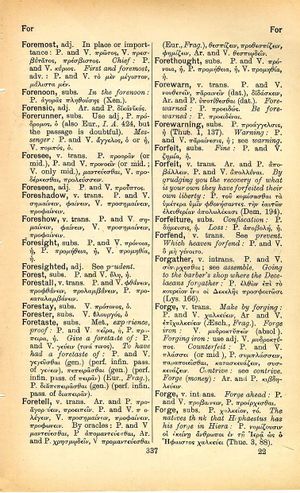forerunner: Difference between revisions
From LSJ
τοῖς πράγμασιν γὰρ οὐχὶ θυμοῦσθαι χρεών· μέλει γὰρ αὐτοῖς οὐδέν· ἀλλ' οὑντυγχάνων τὰ πράγματ' ὀρθῶς ἂν τιθῇ, πράξει καλῶς → It does no good to rage at circumstance; events will take their course with no regard for us. But he who makes the best of those events he lights upon will not fare ill.
(CSV4) |
m (Woodhouse1 replacement) |
||
| Line 1: | Line 1: | ||
{{Woodhouse1 | {{Woodhouse1 | ||
|Text=[[File:woodhouse_337.jpg|thumb|link={{filepath:woodhouse_337.jpg}}]] | |Text=[[File:woodhouse_337.jpg|thumb|link={{filepath:woodhouse_337.jpg}}]] | ||
Use | ===substantive=== | ||
Use adj., [[prose|P.]] [[πρόδρομος]], ὁ (also [[Euripides|Eur.]], ''[[Iphigenia in Aulis]]'' 424, [[but the passage is doubtful]]). | |||
[[messenger]]: [[prose|P.]] and [[verse|V.]] [[ἄγγελος]], ὁ or ἡ, [[verse|V.]] [[πομπός]], ὁ. | |||
}} | }} | ||

